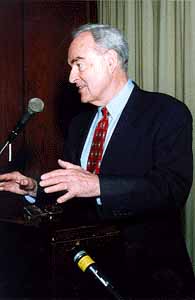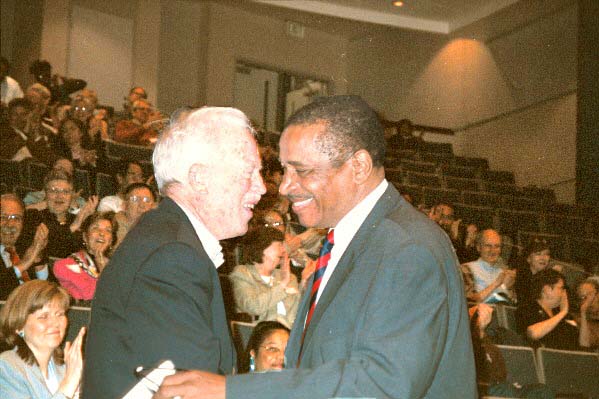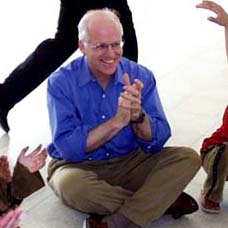2006.09.25: September 25, 2006: Headlines: Figures: Staff: COS - Ethiopia: Country Directors - Ethiopia: History: the Third Goal: Maryland Returned Volunteers: Senator Harris Wofford to keynote at 4th Annual "Peace Corps History" series at UMBC
Peace Corps Online:
Peace Corps News:
Library:
Peace Corps: The Third Goal :
The Peace Corps and the Third Goal:
2006.09.25: September 25, 2006: Headlines: Figures: Staff: COS - Ethiopia: Country Directors - Ethiopia: History: the Third Goal: Maryland Returned Volunteers: Senator Harris Wofford to keynote at 4th Annual "Peace Corps History" series at UMBC
 | Harris Wofford to speak at "PC History" series
Senator Harris Wofford will be the speaker at the 4th Annual "Peace Corps History" series on November 16 sponsored by the University of Maryland at Baltimore County (UMBC) and the Maryland Returned Volunteers. Previous speakers in the series have included Jack Vaughn (Second Director of the Peace Corps), Scott Stossel (Biographer of Sargent Shriver), and C. Payne Lucas (President Emeritus of Africare). Details on the time and location of the event are available here. |
Senator Harris Wofford to keynote at 4th Annual "Peace Corps History" series at UMBC

Wofford's political career began in 1960 when he served as an advisor to the presidential campaign of John F. Kennedy. When King was imprisoned shortly before the election, Wofford persuaded Kennedy to call King's wife and offer his support -- a move that helped shift the African American vote decisively in Kennedy's favor and may have won him the election. In 1961, Kennedy appointed him as a special assistant to the President on civil rights. He also served as chairman of the Subcabinet Group on Civil Rights. He was instrumental in the formation of the Peace Corps and served as the Peace Corps' special representative to Africa and director of operations in Ethiopia. He was appointed associate director of the Peace Corps in 1962 and held that position until 1966. Former Senator Harris Wofford of Pennsylvania, was the Country Director of Ethiopia. Wofford's book Of Kennedy and Kings details his years in the civil rights movement and the creation of the Peace Corps.
Senator Harris Wofford to keynote at 4th Annual "Peace Corps History" series at UMBC
The Maryland Returned Volunteers and the Shriver Center at the University of Maryland Baltimore County (UMBC) announced today that Senator Harris Wofford will give the keynote address at the 4th annual "Peace Corps History" series on November 16.
Harris Llewellyn Wofford (born April 9, 1926) is an American politician and member of the Democratic Party who served as a U.S. Senator from Pennsylvania from 1991 to 1995.
Harris Wofford was born in New York City in 1926. While attending high school, he was inspired by Clarence Streit's plea for a world government to found the Student Federalists (see [1]). After attending the University of Chicago, he attended law school at Yale and Howard University. He served in the United States Army Air Forces during the Second World War.
He began his public service career as an attorney for the U.S. Commission on Civil Rights serving from 1954 to 1958. In 1959, he became a law professor at University of Notre Dame. He was an early supporter of the Civil Rights movement in the south in the late 1950s and became a friend and unofficial advisor to Martin Luther King, Jr..
Wofford's political career began in 1960 when he served as an advisor to the presidential campaign of John F. Kennedy. When King was imprisoned shortly before the election, Wofford persuaded Kennedy to call King's wife and offer his support -- a move that helped shift the African American vote decisively in Kennedy's favor and may have won him the election.
In 1961, Kennedy appointed him as a special assistant to the President on civil rights. He also served as chairman of the Subcabinet Group on Civil Rights. He was instrumental in the formation of the Peace Corps and served as the Peace Corps' special representative to Africa and director of operations in Ethiopia. He was appointed associate director of the Peace Corps in 1962 and held that position until 1966.
Wofford's book Of Kennedy and Kings details his years in the civil rights movement and the creation of the Peace Corps.
In 1966, Wofford left politics to become president of the State University of New York at Old Westbury. In 1970, he became president of Bryn Mawr College in Pennsylvania and held that post until 1978.
After spending seven years in private law practice and one year as state chairman of the Democratic Party, Wofford was appointed by Pennsylvania Governor Bob Casey as the state's Secretary of Labor and Industry in 1987.
On April 4, 1991, Pennsylvania's senior U.S. Senator, John Heinz, died in an aviation accident leaving his seat in the U.S. Senate open. By law, the Pennsylvania governor was required to appoint a replacement until a special election could be held for the seat. After considering several potential candidates, including Allentown, Pennsylvania, native Lee Iacocca, who turned down the job, Governor Casey appointed Wofford to the seat on May 8, 1991.
In the special election held in November 1991, Wofford faced Dick Thornburgh, the former Pennsylvania governor and U.S. Attorney General under Presidents Reagan and George H. W. Bush. Wofford began the campaign so far behind in the polls that most pundits assumed he had no chance of winning. His eventual victory over the former governor by ten percentage points surprised many. His campaign was run by Paul Begala and James Carville, and their dramatic success brought them to national attention. The campaign was also a proving ground for many of the themes that would underlie Bill Clinton's 1992 victory such as the focus on the economy and health care. He was considered for the vice presidential nomination, although Clinton would ultimately choose Al Gore.
In May 1993, Wofford received an honorary doctorate degree from Elizabethtown College, Pennsylvania.
Wofford narrowly lost his bid for re-election to Republican Congressman Rick Santorum (32 years his junior), who won with 49 percent of the vote. The vote, in November, 1994, was part of the 1994 Republican landslide in which many Democrats were ousted from both Houses of the United States Congress.
After his time in the Senate, Wofford served as chief executive officer of the Corporation for National and Community Service (the federal agency that runs AmeriCorps and other domestic volunteer programs), from 1995 to 2001. Since his retirement, he has taught at the University of Maryland, College Park and served on the boards of several charities and service organizations including America’s Promise, Youth Service America, and the Points of Light Foundation. He was the recipient of the John W. Gardner Leadership Award in 2002. He is currently a senior fellow at the Case Foundation in Washington, D.C.
About the Peace Corps History Series

Caption: C. Payne Lucas (right), founder of Africare salutes Peace Corps Director Jack Vaughn (Director from 1966 to 1969) at the first annual "Peace Corps History" series at UMBC in 2003.
The "Peace Corps History" series was created in 2003 as a third goal activity by Hugh Pickens, Publisher and Co-Editor of Peace Corps Online and President Emeritus of the Maryland Returned Volunteers to honor the the creators of the Peace Corps, to study the history of the agency, and to provide a forum for a critical analysis of the evolution of the Peace Corps and its programs.
The speaker at the first "Peace Corps History" series was Jack Vaughn, the second Director of the Peace Corps. Scott Stossel, the authorized biographer of Peace Corps Founding Director Sargent Shriver was the keynote speaker at the 2nd annual "Peace Corps History" series in 2004. "Peace Corps Giant" C. Payne Lucas, founder of Africare and co-author of "Keeping Kennedy's Promise," spoke on "the Peace Corps and the challenge in Africa" in 2005 at the 3rd annual "Peace Corps History" series. The "Peace Corps History" series is currently directed by Joby Taylor (RPCV Gabon), Director of the Shriver Peaceworker Program at UMBC.
When this story was posted in September 2006, this was on the front page of PCOL:





Peace Corps Online The Independent News Forum serving Returned Peace Corps Volunteers
 | Chris Dodd's Vision for the Peace Corps
Senator Chris Dodd (RPCV Dominican Republic) spoke at the ceremony for this year's Shriver Award and elaborated on issues he raised at Ron Tschetter's hearings. Dodd plans to introduce legislation that may include: setting aside a portion of Peace Corps' budget as seed money for demonstration projects and third goal activities (after adjusting the annual budget upward to accommodate the added expense), more volunteer input into Peace Corps operations, removing medical, healthcare and tax impediments that discourage older volunteers, providing more transparency in the medical screening and appeals process, a more comprehensive health safety net for recently-returned volunteers, and authorizing volunteers to accept, under certain circumstances, private donations to support their development projects. He plans to circulate draft legislation for review to members of the Peace Corps community and welcomes RPCV comments. |
 | He served with honor
One year ago, Staff Sgt. Robert J. Paul (RPCV Kenya) carried on an ongoing dialog on this website on the military and the peace corps and his role as a member of a Civil Affairs Team in Iraq and Afghanistan. We have just received a report that Sargeant Paul has been killed by a car bomb in Kabul. Words cannot express our feeling of loss for this tremendous injury to the entire RPCV community. Most of us didn't know him personally but we knew him from his words. Our thoughts go out to his family and friends. He was one of ours and he served with honor. |
 | Chris Shays Shifts to Favor an Iraq Timetable
In a policy shift, RPCV Congressman Chris Shays, long a staunch advocate of the Bush administration's position in Iraq, is now proposing a timetable for a withdrawal of American troops. How Mr. Shays came to this change of heart is, he says, a matter of a newfound substantive belief that Iraqis need to be prodded into taking greater control of their own destiny under the country’s newly formed government. As Chairman of the House Government Reform subcommittee on national security, he plans to draft a timetable for a phased withdrawal and then push for its adoption. A conscientious objector during the Vietnam War who said that if drafted he would not serve, Chris Shays has made 14 trips to Iraq and was the first Congressman to enter the country after the war - against the wishes of the Department of Defense. |
 | Peace Corps' Screening and Medical Clearance
The purpose of Peace Corps' screening and medical clearance process is to ensure safe accommodation for applicants and minimize undue risk exposure for volunteers to allow PCVS to complete their service without compromising their entry health status. To further these goals, PCOL has obtained a copy of the Peace Corps Screening Guidelines Manual through the Freedom of Information Act (FOIA) and has posted it in the "Peace Corps Library." Applicants and Medical Professionals (especially those who have already served as volunteers) are urged to review the guidelines and leave their comments and suggestions. Then read the story of one RPCV's journey through medical screening and his suggestions for changes to the process. |
 | The Peace Corps is "fashionable" again
The LA Times says that "the Peace Corps is booming again and "It's hard to know exactly what's behind the resurgence." PCOL Comment: Since the founding of the Peace Corps 45 years ago, Americans have answered Kennedy's call: "Ask not what your country can do for you--ask what you can do for your country. My fellow citizens of the world: ask not what America will do for you, but what together we can do for the freedom of man." Over 182,000 have served. Another 200,000 have applied and been unable to serve because of lack of Congressional funding. The Peace Corps has never gone out of fashion. It's Congress that hasn't been keeping pace. |
 | PCOL readership increases 100%
Monthly readership on "Peace Corps Online" has increased in the past twelve months to 350,000 visitors - over eleven thousand every day - a 100% increase since this time last year. Thanks again, RPCVs and Friends of the Peace Corps, for making PCOL your source of information for the Peace Corps community. And thanks for supporting the Peace Corps Library and History of the Peace Corps. Stay tuned, the best is yet to come. |
 | History of the Peace Corps
PCOL is proud to announce that Phase One of the "History of the Peace Corps" is now available online. This installment includes over 5,000 pages of primary source documents from the archives of the Peace Corps including every issue of "Peace Corps News," "Peace Corps Times," "Peace Corps Volunteer," "Action Update," and every annual report of the Peace Corps to Congress since 1961. "Ask Not" is an ongoing project. Read how you can help. |
Read the stories and leave your comments.

Some postings on Peace Corps Online are provided to the individual members of this group without permission of the copyright owner for the non-profit purposes of criticism, comment, education, scholarship, and research under the "Fair Use" provisions of U.S. Government copyright laws and they may not be distributed further without permission of the copyright owner. Peace Corps Online does not vouch for the accuracy of the content of the postings, which is the sole responsibility of the copyright holder.
Story Source: Maryland Returned Volunteers
This story has been posted in the following forums: : Headlines; Figures; Staff; COS - Ethiopia; Country Directors - Ethiopia; History; the Third Goal
PCOL34565
37



















